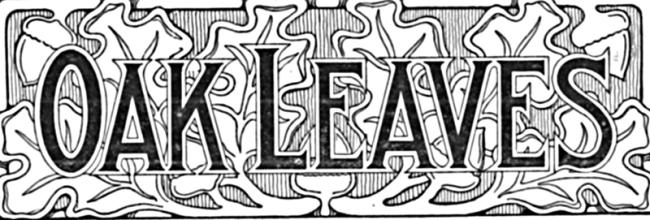“All politics is local.” So goes the time-honored phrase. It certainly seems true if your source of political news and opinion is your local newspaper. For most of the history of the two villages that local news source was The Oak Leaves. In 1980 the Wednesday Journal joined in the business of letting Oak Park and River Foresters know what was going on locally. Coverage of national, state or even county news was sparse at best. An outbreak of head lice in the schools was more newsworthy than developments in Washington, D.C., Springfield, or Chicago. For the most part this localism applied even to the election of a President. Any editorial comment, letters to the editor, or a formal endorsement of a candidate was left to other news outlets.
An exception was the 1968 Presidential election. On the eve of that vote the Oak Leaves made clear in a long editorial that “Our Choice is Nixon”. Noting that, with the exception of Eisenhower’s two terms, the Democrats had dominated the Presidency, Congress and the great urban centers for most of the middle third of the century. The decade of the 1960s had been a period of “unrest, unease, turmoil and disunity.” During that time the Democrats “have failed miserably” to solve the big problems confronting Americans, including “the tragic war in Vietnam…the turmoil and decay of our cities, the tensions between black and white, the disenchantment of our young people…the yawning credibility gap in government, the growing disaffection of many segments of our society.” To the editors, the nation and the Free World were fortunate that at this critical time there was a man “uniquely able and remarkably well prepared” to assume the great burdens of the Presidency. That man is Richard Nixon.” In the view of the editors Nixon was a “strong, sane, balanced leader with courage, compassion and good sense.” Nixon’s goal of unifying a divided nation, while “enforcing every law and every civil right, [was] a purpose with which no rational man can quarrel.” In contrast, Vice President Hubert Humphrey represented the policies of “a tired, unpopular, and discredited” administration. A vote for the third candidate, former Alabama governor George Wallace, whose “neat, easy solutions…undeniably have considerable appeal to many”, but who had no chance to win, would be wasted and might “contribute to the election of Humphrey.” This election was an opportunity “to restore balance and good sense, sanity and integrity to the White House. We urge every citizen to vote…proudly for Richard Nixon.” Oak Parkers apparently agreed and voted nearly 2 to 1, 65% to 33%, for Nixon over Humphrey. Wallace garnered 5.6% of the vote.
In the 1972 election, pitting incumbent President Nixon against liberal anti-war Senator George McGovern, the Oak Leaves made no endorsement. It hardly mattered, since Nixon won a landslide nationally and locally. Four years later the Oak Leaves again made no endorsement, but did conduct a pre-election telephone straw poll that showed Nixon’s successor following his resignation Gerald Ford winning handily over Democrat Jimmy Carter 49.5% to 24%. A week later the actual vote was closer, but still heavily in favor of Ford, 60% to 40% for Carter. Of course Carter defeated Ford in the national vote. As through its history Oak Park remained solidly Republican.
In 1980 the conservative “Reagan Revolution” that swept the California governor into the White House over the incumbent President Carter was not so apparent in Oak Park, where Reagan won a narrow victory; 44% to 41%. In contrast River Foresters vote 60% for Reagan and 24% for Carter. In 1984 that split between Oak Park and River Forest voters was even clearer. In Oak Park the Democrat Walter Mondale actually carried Oak Park by 50.3% to 49.7% for Reagan. River Forest voted 77.5% for Reagan and 27.2% for Mondale. This shift in Oak Park from Republican to Democratic voting was made final in the 1988 election. Michael Dukakis, although defeated soundly by George Bush Sr. nationally, won Oak Park 58.5% to 41.5% , while River Forest favored Bush 63% to 34%.
Oak Park’s emergence as a reliably Democratic, liberal village, in the wake of local political and demographic changes such as the 1968 Open Housing Ordinance, is reflected in the results of the Presidential elections of 1968 to 1988.
Submitted by Bob Messer
June 15 2018
